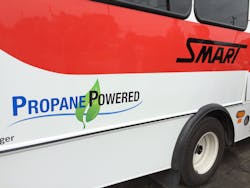Last year, the Environmental Protection Agency filed a complaint against Volkswagen alleging that they violated the Clean Air Act. Volkswagen was found guilty and agreed to spend billions to settle these allegations, which includes a $2.9 billion Environmental Mitigation Trust. Over the next 10 years, the trust will fund environmental mitigation projects that specifically reduce emissions of nitrogen oxides, known as NOx.
Transit agencies could benefit from eligible projects, which include class 4-8 shuttle or bus replacement and class 4-7 medium-duty truck replacement.
Each state will receive a set amount based on the number of affected vehicles sold in that state. You can find a state-by-state listing at ROUSHcleantech.com/volkswagen-settlement/. Wilmington Trust has been appointed as the Trustee to allocate the funds. Once the trustee effective date is set, state beneficiaries will be named, and states can file their mitigation plans for Trustee approval.
What can you do? Start by learning who your state’s beneficiary is and let them know why they should allocate funding toward propane autogas-fueled transit vehicles. Then understand how to convert your fleet to propane autogas. Here are three steps.
Step 1: Understand the benefits.
Propane autogas can reduce your costs and your emissions.
Propane autogas costs about 40 percent less than gasoline and 50 percent less than diesel. Transit fleet operators have experienced lower costs for oil changes and routine maintenance due to the fuel’s clean-burning properties.
Michigan’s SMART projects total fuel and maintenance savings for its 61 propane autogas bus fleet to be $1.1 - $1.7 million over the lifetime of the fleet, with a return on investment of less than four months.
Propane autogas is naturally lower in NOx than gasoline or diesel. Vehicles fueled by propane autogas emit fewer greenhouse gases and fewer particulate emissions than models fueled by gasoline. When compared to conventional diesel, fueling with propane autogas results in an estimated 80 percent reduction in hydrocarbon emissions and virtually eliminates particulate matter.
By fueling with propane autogas, Florida’s LeeTran is eliminating 1.8 million pounds of carbon dioxide over the lifetime of its 20 shuttles, compared to conventionally fueled counterparts.
Step 2: Assess your current fleet.
High-mileage, fixed-route transit and shared ride, advanced reservation paratransit buses are an ideal fit for fueling with propane autogas.
Compare total cost of ownership between various vehicles. The higher the annual miles driven and the lower the vehicle’s fuel efficiency, the more likely propane autogas will provide a quick return on investment. A savings calculator, propane.com/on-road-fleets/calculator/, will help you measure the cost per mile.
There are several propane autogas options ideal for public transportation. For instance, Ford offers a full line of commercial vehicles that come with engines prepped from the factory for gaseous fuels like propane autogas.
For paratransit applications, the medium-duty Ford E-450 chassis equipped with a ROUSH CleanTech propane autogas fuel system has completed Federal Transit Administration’s New Model Bus Testing Program and can be purchased using a transit agency’s FTA funds. The medium-duty Ford F-550 chassis mini-bus option come equipped with a Ford 6.8L V10 engine and ROUSH CleanTech propane autogas fuel system.
Each of these models can be upfitted to meet the transit agency’s specifications, and would qualify for funding from the Environmental Mitigation Trust.
Step 3: Determine a fueling strategy.
Your fueling choices are to fill up at public propane autogas fueling stations, at a private pump on your fleet’s premises or to contract for onsite fueling services.
Because agency vehicles usually return to a central point, an onsite propane station works well. Propane providers specialize in helping fleets choose the right fueling option based on fleet size, routes, budget and facility space. Many propane providers will install a station at no cost with a fuel contract.
Another option is to contract with a propane supplier to perform onsite propane autogas fueling services. The propane supplier comes to your location and fuels from their bobtail truck. And for fleets with limited space, public stations can be the solution.
Funds from the trust could be available soon. Now is the time to make the case for clean-burning propane autogas transit vehicles to reduce NOx and save money.
Todd Mouw is vice president of sales and marketing for ROUSH CleanTech and has served as president of the NTEA Green Truck Association.
About the Author

Todd Mouw
Executive Vice President of Sales and Marketing
Todd Mouw is executive vice president of sales and marketing for ROUSH CleanTech, an industry leader of alternative fuel vehicle technology. Mouw has served as president of the NTEA Green Truck Association.
